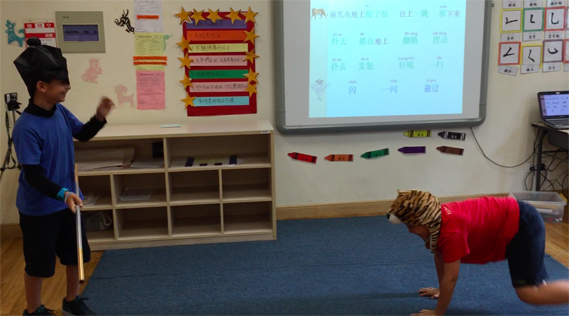
When it comes to drama education, most people may think: ‘isn’t it just about rehearsing a script?’ I'll admit I also felt this way, that is, until I met famed Chinese children's drama director Ms Zhang Chenting. That’s when I understood that the goal is to successfully enhance foreign language teaching by incorporating elements of drama.
When studying literary works, learners of foreign languages usually have reservations about the level of difficulty, that their vocabulary and usage are not enough to transcend a surface-level understanding of the material, much less the logical relationship between words and paragraphs. Trying to understand the psychological state between the characters, therefore, would sound even more daunting.
For these reasons, I have been exploring more suitable ways for foreign students to study Chinese literature that is both effective and interesting. I was fortunate enough to find a method beyond the traditional foreign language teaching methods – educational drama. It’s a method based on a kind of language teaching strategy, rather than one based solely on rehearsals.
There are two main objectives of the class: Dramatic elements and points of knowledge – how to use drama and foreign language teaching via impromptu performances and drama games to encourage students to engage in logical thinking, make speculations on the characters’ mental states, develop the ability to expressive themselves in a second language and strengthen writing skills in a fun and interesting learning environment.
For example, with Year 5’s text ‘Wu Song Fights the Tiger’ (part of China’s Four Great Classical Novels), we used action words to understand key sections, including one in which three battles ensued between the tiger and Wu Song. The verbs used in each battle were different, but simply teaching them won’t help them understand the specifics. Before studying this section, we invited two PE teachers to take on the roles of the tiger and Wu Song, and ‘do battle.’ In each of the three battles, students were asked to identify the action words associated with both characters, why these words were used and sequence of events leading up to the action and those occurring afterwards. Why were the battles depicted this way? What do these actions reveal about the emotional state of the tiger upon his eventual defeat? The three battles represent three levels of emotions, disclose important information and is directly related to the choice of words and sentences.
This practice is extremely effective in improving students’ ability to observe, express, retell and write. The process of studying a text provides students with training in the thinking process, one that includes logical thinking and reasoning, an ability that all students should have.
Experimental programmes in drama are just the tip of the iceberg. Learning from a script by memorising lines is not only an outdated method – it is learning that is stripped of a purpose or thinking process: performing for the sake of performing. In September 2015, at the National Taiwan Normal University, I had the honour of giving a presentation on the role of drama in education and second-language learning, which attracted the interest of several teachers. International schools are beginning to recognise the importance of drama in different areas of education. The challenge for teachers of foreign language teachers is how to effectively incorporate drama into learning.
In Chinese, we say (in much less words, of course!) that: ‘If you want to reach the towering peaks of knowledge, diligence is the only path to the summit; if you want to swim in the boundless sea of knowledge, patience, hard work, and a good attitude will bring you to the success of the other side.’ In addition to the educational practices and skills, we will continue to explore more areas in drama as well as the beauty in the art of language. As teachers of language, we not only hope that more second foreign students will enjoy studying Chinese, but that through the beauty of the written word, we can help them further appreciate Chinese culture.
Lily Jin, CAL Coordinator